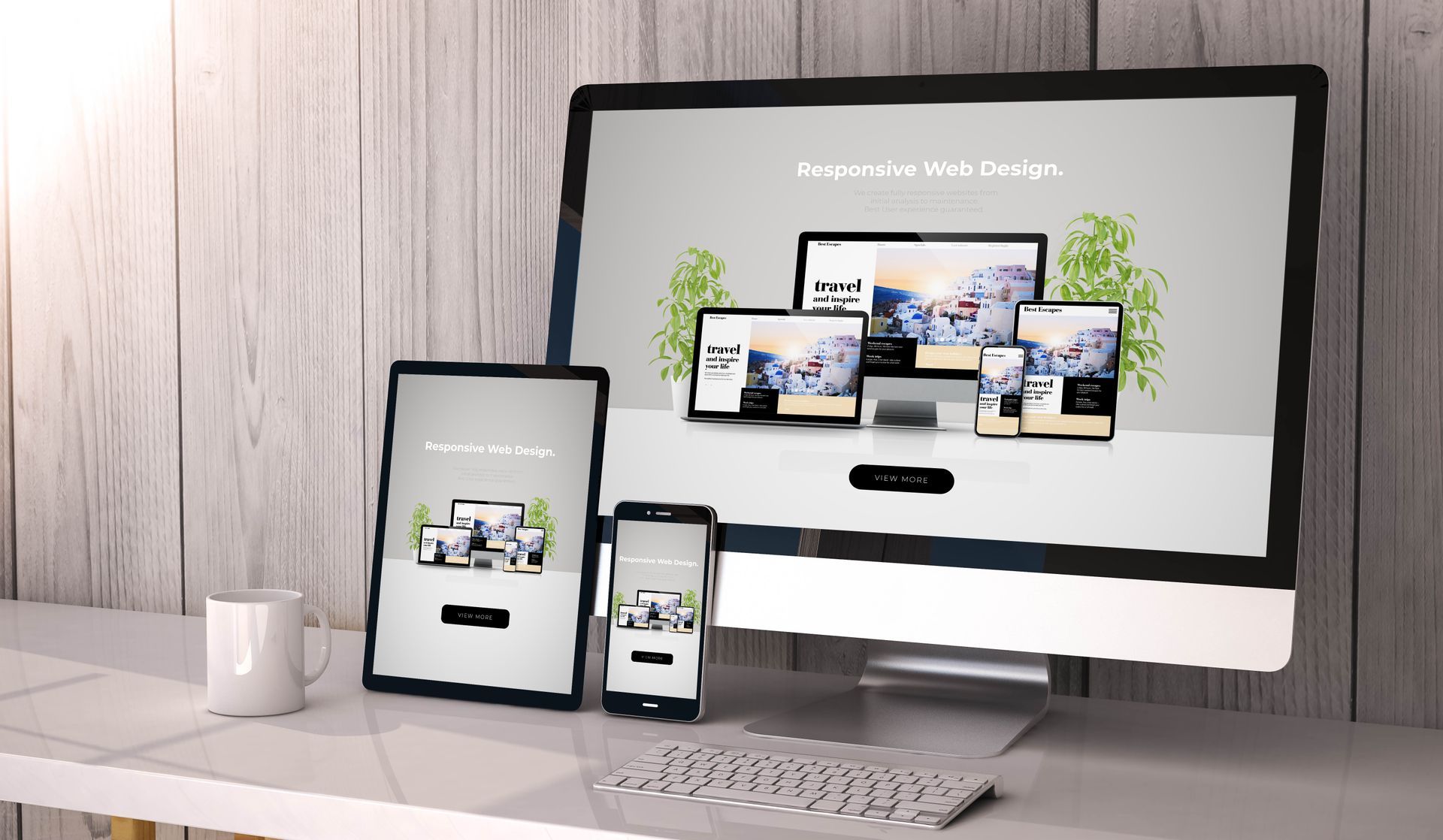Uncovering the Real Costs: A Comprehensive Guide to Building Your Website
Uncovering the Real Costs: A Comprehensive Guide to Building Your Website
Building a website can be an exciting and rewarding endeavour, but it's important to understand the real costs involved. In this comprehensive guide, we'll dive deep into the various aspects of website building, uncovering the expenses you need to be aware of. Whether you're a small business owner, a blogger, or an entrepreneur, this article will provide you with the information you need to make informed decisions.
From domain registration to web hosting, design and development, to ongoing maintenance and updates, we'll explore all the key elements of website building. We'll break down the costs and discuss different options available, allowing you to choose the right approach for your budget and goals.
No matter your experience level or industry, this guide will empower you to take control of your website project. By understanding the real costs involved, you can avoid unexpected expenses and ensure a smooth and successful website building journey. So let's get started and uncover the true costs of building your website.
The importance of a professional website
In today's digital age, having a professional website is essential for success. Your website is often the first point of contact for potential customers or clients, and it serves as a virtual representation of your brand. A well-designed and user-friendly website can establish credibility, build trust, and attract new business opportunities.
However, building a professional website requires careful planning and investment. It's not just about throwing together a few web pages and calling it a day. To truly stand out and make an impact, you need to consider the different costs involved in creating a website that reflects your brand's personality and meets your audience's needs.
Understanding the different costs involved in building a website
Before you embark on your website building journey, it's crucial to have a clear understanding of the various costs you'll encounter along the way. Let's break them down:
-
Domain name and hosting expenses
The first step in building a website is securing a domain name (e.g., www.yourbusinessname.com) and finding a reliable hosting provider to store your website files. Domain registration fees can vary depending on the domain extension (.com, .net, .org, etc.) and the registrar you choose. On average, you can expect to pay around £10 to £20 per year for a domain name.
Web hosting costs also vary depending on factors like storage space, bandwidth, and server performance. Shared hosting plans, which are more affordable, can start at around £5 to £10 per month. If you anticipate high traffic or need more control over your hosting environment, you may opt for a virtual private server (VPS) or dedicated server, which can range from £20 to £200 per month.
-
Website design and development costs
The design and development of your website are crucial to its success. This is where you'll need to allocate a significant portion of your budget. The cost of website design and development can vary greatly depending on factors like complexity, functionality, and the expertise of the professionals you hire.
For a basic website with a few pages and standard features, you can expect to pay anywhere from £500 to £5,000. If you require additional customisation, such as e-commerce functionality or a content management system (CMS), the costs can range from £5,000 to £20,000 or more. Hiring a professional web design agency or freelance developer will ensure high-quality work, but it may come at a higher price tag.
-
Content creation and copywriting expenses
Compelling content is the backbone of any successful website. Whether it's engaging blog posts, persuasive product descriptions, or informative service pages, investing in high-quality content is crucial to attract and retain your target audience.
If you have the skills and time, you can create content yourself, which will save you money. However, if you prefer to outsource this task, professional copywriters and content creators usually charge on a per-word or per-project basis. Rates can vary depending on experience and industry, but you can expect to pay anywhere from £0.05 to £0.50 per word. For a 1,000-word blog post, this would equate to £50 to £500.
-
Additional features and functionality costs
Depending on the goals and requirements of your website, you may need to invest in additional features and functionality. This can include things like e-commerce integration, booking systems, membership portals, or custom forms. These enhancements can greatly enhance the user experience but may come at an additional cost.
The pricing for additional features and functionality can vary widely depending on the complexity and the technology required. Off-the-shelf plugins or extensions can range from free to a few hundred pounds. Custom development, on the other hand, can significantly increase the cost, with prices starting at £1,000 and going upwards of £10,000 or more.
-
Maintenance and ongoing support fees
Once your website is up and running, it's important to consider the ongoing maintenance and support required to keep it running smoothly. This includes tasks such as software updates, security monitoring, regular backups, and technical support.
If you have the technical skills and time, you can handle these tasks yourself. However, if you prefer to outsource them, many web development agencies and hosting providers offer maintenance and support packages. These packages can range from a few pounds per month to several hundred pounds, depending on the level of service and support you require.
-
Tips for budgeting and cost-saving strategies
Building a website can be a significant investment, but there are ways to optimise your budget and save on costs. Here are a few tips to help you stay within your budget:
1. Plan and prioritise: Clearly define your website's goals and prioritise the features and functionality that are essential for your business. This will help you allocate your budget more effectively.
2. Research and compare: Take the time to research different domain registrars, hosting providers, and web development agencies. Compare prices, features, and customer reviews to find the best value for your money.
3. Use open-source platforms: Consider using open-source content management systems like WordPress, Joomla, or Drupal. These platforms are free to use and have a vast community of developers and designers, which can help reduce development costs.
4. DIY where possible: If you have the time and skills, consider taking on certain tasks yourself, such as content creation, basic design tweaks, or minor updates. This can save you money in the long run.
5. Plan for scalability: While it's essential to start with a budget-friendly approach, it's also crucial to plan for future growth and scalability. Consider choosing a hosting provider and web development framework that can accommodate your future needs without requiring a complete overhaul.
-
Hiring a professional web development agency vs. DIY website builders
When it comes to building a website, you have two main options: hiring a professional web development agency or using a DIY website builder. Each approach has its pros and cons, and the choice depends on your budget, technical skills, and the level of customisation you require.
Hiring a professional web development agency offers numerous benefits, including expertise, customisation options, and ongoing support. However, it can be more expensive compared to using a DIY website builder. DIY website builders are more cost-effective and user-friendly, but they may have limitations in terms of customisation and functionality.
Consider your budget, goals, and technical abilities when making this decision. If you have the budget and require a highly customised website, hiring a professional is the way to go. If you're on a tight budget and need a simple website, a DIY website builder could be a good option.

Conclusion: Investing in your website for long-term success
Building a website is an investment in your business or personal brand. By understanding the real costs involved, you can make informed decisions and avoid unexpected expenses. Remember, a professional website can have a significant impact on your success, so it's important to allocate the necessary resources and budget accordingly.
Consider the different elements we've explored in this guide, from domain registration and web hosting to design and development, content creation, additional features, and ongoing maintenance. With careful planning, budgeting, and cost-saving strategies, you can create a website that not only meets your goals but also provides a positive user experience for your audience.
So, whether you're starting a small business, launching a blog, or expanding your online presence, take the time to uncover the true costs of building your website. By investing wisely and prioritising your website project, you'll set yourself up for long-term success in the digital world.
Remember, building a website is not just about the upfront costs; it's an ongoing process that requires regular updates, maintenance, and optimisation. Keep this in mind as you embark on your website building journey, and you'll be well-prepared to create a website that stands out from the competition and delivers results.
 Rating
Rating

Let's have a coffee
We’d love to hear from you! Just choose the most convenient method and we’ll get back to you as soon as we can.
Tel: 01244 629 523
Email: hello@H10marketing.co.uk
© Copyright 2024 H10 Marketing Ltd. All Rights Reserved.
Company Registration No: 11030469. VAT No. 427333211. Registered Office: Attention: Sarah Hawkins, 1 Old Marsh Farm Barns Business Centre, Old Marsh Farm Road, Sealand, Deeside, Flintshire, CH5 2LY, United Kingdom.












